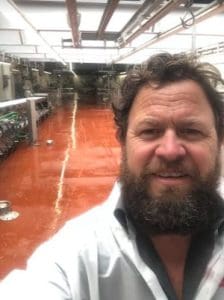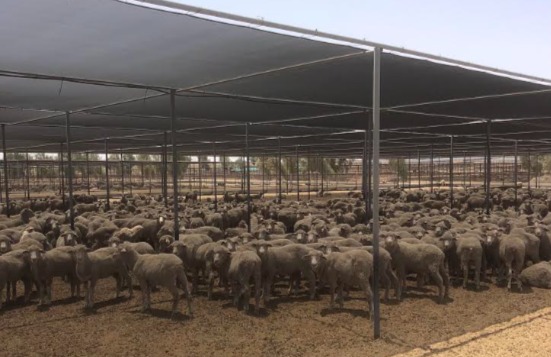
Minister for Agriculture Murray Watt.
MINISTER for Agriculture Murray Watt will not make any commitments on compensation for the losers in the proposed live sheep trade phase-out until industry consultation is completed.
Minister Watt told Sheep Central that he is very aware the government is dealing with a complex supply chain, with many businesses involved in the preparation, transport and export of live sheep.
“The Albanese Government is determined to ensure that the views of those businesses are heard as part of this process, which will be undertaken in a considered and orderly way.
“We haven’t made any commitments about compensation and that is something that we would determine after we’ve undertaken that consultation,” he said.
“I would emphasise, though, that the phase-out will be implemented over a number of years, allowing farmers, markets and supply chains to plan and prepare for the transition away from live sheep exports.
“We also have some great opportunities to increase domestic meat processing capacity and, through this, to employ more Australians to produce value-added products for our export markets,” Mr Watt said.
Sheep Central: Get our free news straight to your inbox – Click here
Live sheep industry is preparing its case

Western Australian sheep producer Steve Bolt in a Kuwait abattoir.
The Western Australian sheep industry is readying itself to fete Agriculture Minister Murray Watt, unwilling to concede defeat in its fight to retain the live sheep trade.
Livestock Collective director and trade supplier Steve Bolt said he is looking forward to firstly having constructive discussions with Minister for Agriculture Murray Watt.
Mr Bolt said the Livestock Collective would be inviting Mr Watt, Liberal Party deputy Sussan Ley and other politicians to see first-hand the importance of live export to the WA sheep industry, by inspecting the feeding, watering and ventilation systems at feedlots and on vessels when exports resume in September.
“And then on farms to get an understanding from producers how the live export trade works within their businesses.”
Prime Minister Albanese has said the trade will not be phased out before 2025, and not before industry consultation, and Mr Bolt said he is always optimistic that the WA industry will be able to show how sustainable the trade is.
“Mr Watt’s statements that closing the trade is the right thing to do is not backed by any facts or science and so we look forward to the opportunity to engage in discussions with the Minister about the performance of the industry.”
But if the Albanese Government continues with its plan to phase-out the trade after consultation, Mr Bolt believes a class action for compensation would be considered.
“I don’t want to at any point concede that there will be an end to the trade, because the trade performance will speak for itself.“
But they would be taking away a legitimate industry that has delivered on all government regulations and requirements,” he said.
Mr Bolt said “absolutely” the industry would investigate a class action for compensation if the trade was closed down.
“I think there would be no doubt there would be a class action coming from producers and the WA sheep industry.
“Any continuation by the government down the path of phase-out will be met by strong resistance from the WA sheep industry,” he said.
“If they continued down that path we would explore all options.”
Northern cattle producers seeking class action compensation for the Federal Government’s snap ban on live exports to Indonesia 11 years ago have estimated their costs will be about $2 billion.
Mr Bolt also believed any moves to close the important trade would come with consequences from WA voters in subsequent elections.
The sheep producer has visited the Middle East feedlots and processing plants of Australia’s major live sheep exporter, Kuwait Livestock Transport and Trading, and he disagrees with the positions of Mr Hall and Ms Ley that the trade can be replaced with domestic carcase processing and value-adding.
“All of the live sheep are processed (in-market) and go into wet markets.“
People come and select their sheep, they bring the family along, they watch that sheep be processed and they then take their box with their sheep and head for home,” he said.
“It is a completely separate market to the chilled and frozen market that we already supply.”
Mr Bolt said the Middle East importers had told him that they would source live sheep from other markets to guarantee food security if they could not get sheep from Australia.
“They will not be replacing it with boxed, chilled or frozen product from countries like Australia.”
He said the importers also told him the improvements in sheep performance and welfare due to Australia’s implementation of reduced stock densities had led to similar changes in supply chains form other countries.”
“Australia being in the market and being a clear leader in animal welfare has flowed on to standards in other markets throughout the world.”
Mr Bolt said it was also not feasible for WA to process the 600,000-1,000,000 sheep exported live, due to the lack of processing capacity.
“We are currently seeing, at the moment, huge numbers of sheep remaining on farms because there is not the processing capacity, due to interruptions caused by COVID.
“We are clearly seeing how exposed the market would be without the ability to send sheep to live export.”
He believes there would be a large reduction in breeding stock in WA and saleyard prices would drop, if the trade was ended. Regional businesses would also be affected.
“I estimate we could lose 20 percent of breeding stock out of the state and we would lose that wool production out of WA.”
He said taking live export away as a sheep market competitor would reduce producers’ prices.
“It underpins the Western Australian sheep market.”
Mr Bolt said the WA sheep industry “takes a lot of heart” from knowing that WA Premier Mark McGowan’s will stand with the sector and support the continuation of the $92 million trade.

Australian sheep in a Kuwait feedlot.
Alliance expects phase-out legislation in first term
The Alliance for Animals director for policy and government relations Dr Jed Goodfellow said while the sheep trade phase-out may not be completed within the government’s first term, it is the alliance’s expectation that Labor will introduce legislation to commence the phase-out within its first term.
“This will also be the expectation of many in the community who welcomed Labor’s announcement during the election campaign.”
He said transitioning the small remaining number of exported sheep into domestic processing is a win-win outcome.
“It will create more jobs and value-adding opportunities in regional Australia and contribute more overall to the economy, all while upholding animal welfare.
“We believe Labor will deliver on this election commitment,” he said.
RSPCA Australia chief executive officer Richard Mussell said the RSPCA wants to see live sheep exports phased out as soon as possible.
“The RSPCA recognises the importance of a transition period to support farmers and ensure the welfare of sheep on Australian shores is prioritised at all stages.
“In the lead-up to the federal election we called for a five-year phase out period which we believe allows for these considerations to be appropriately addressed and allows for this important change to be legislated in this term of parliament, even if the end date goes beyond this,” he said.
“We look forward to working closely with the new Government and Minister to make sure that happens.
“This is a trade that is opposed by the majority of Australians and has inherent, unfixable animal welfare issues,” he said.
“This volatile and disaster-plagued industry has been in terminal decline for some time and research shows that a sheep processed in Australia will contribute a lot more to the Australian economy than live exporting the animal.
“So putting an end date on live export in this term of Parliament is not only the right thing to do for animal welfare, but the right thing to do economically.”
Animal welfare spokesperson for the Greens, Mehreen Faruqi, said there is a strong case for an expeditious phase-out of live sheep export.
“It’s in the government’s interest to get this done sooner rather than later.
“I look forward to meeting with the Minister to discuss it.”

Most Australians, once made aware of the cruel reality of live animal export, are supportive of a total ban.
“Mr Bolt said the Livestock Collective would be inviting Mr Watt, Liberal Party deputy Sussan Ley and other politicians to see first-hand the importance of live export to the WA sheep industry, by inspecting the feeding, watering and ventilation systems at feedlots and on vessels when exports resume in September.”
Firstly, I’m not sure how the feed/water/ventilation systems on a foreign-owned ship could possibly indicate the importance (or otherwise) of a trade.
Secondly, let’s hope Mr Bolt also ensures that Watt, Ley and other politicians all read the Independent Observer reports and reports that document the routine failure of said systems along with other horrific anima welfare outcomes between April 2018 and June 2020. Of course, we don’t know what went unobserved between June 2020 and May 2022, as there were no IOs aboard.
How will banning live sheep create more jobs when there are 10,000 job vacancies already?
Riddle me that?